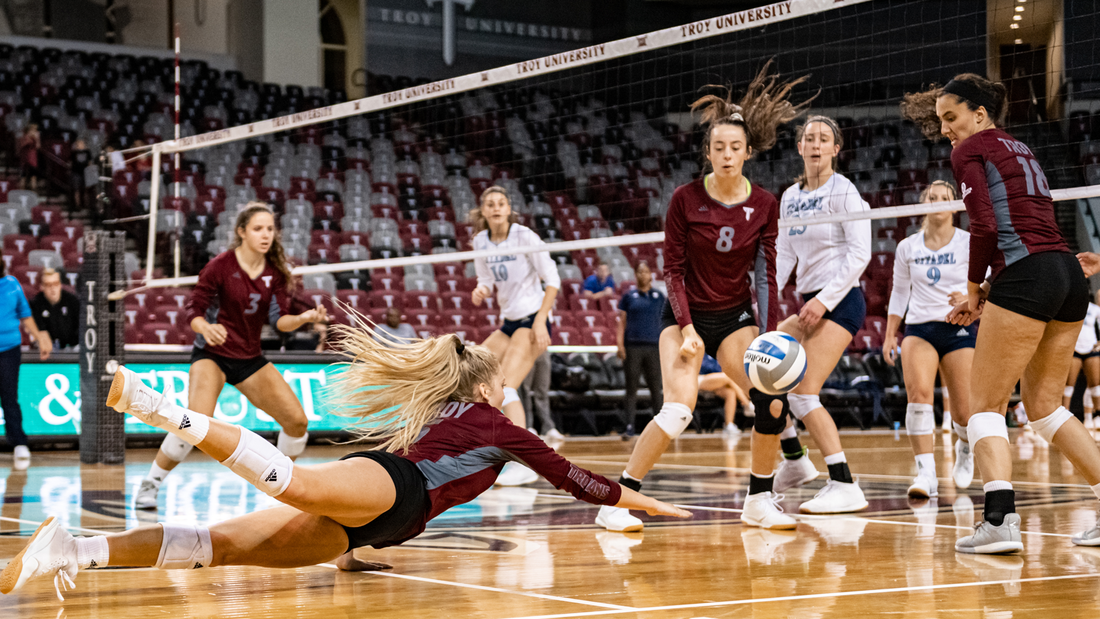|
Volleyball programs can change uniform styles, or how they schedule, or any and all coaches being paid to push the program forward.
The toughest thing is to change the mood, the feel, and sometimes the pall of dead air hanging over the enterprise. Josh Lauer knew upon his arrival at Troy in January of 2017 that the atmosphere needed a serious reset, just as he understood he’d likely pull in the type of recruiting classes the Trojans required to shake off the effects losing. Nothing happened quickly, but Troy is definitely seeing clearer skies after going 22-9 this year and earning a berth in the 2019 National Invitational Volleyball Championship, which is the first postseason bid in program history. The Trojans will take on another first-time postseason squad in North Carolina A&T (16-14) at 4 p.m. ET on Friday at regional host school Georgia Tech. Lauer immediately brought in Jenni Young (a transfer from Towson) and Cheyenne Hayes, then leaned heavy and hard on an eight-person recruiting class in 2018. Hayes, a springy 5-foot-9 junior, has 426 kills on the year and earned first-team all-Sun Belt honors, helping lead the way for the type of player Lauer saw as the right fit. “We needed to hit three core areas when we came in. We needed to recruit high talent, high character players who are going to be here for a while,” said Lauer, who coached for nine years in the SEC before taking over at Troy. “There’d been a history of, a mix of, recruiting transfers along with freshmen, about a 50-50 mix. We want players we could grow with. Jenni Young had four years of eligibility and that followed our model. “Culture change was big for here. We needed to build some trust with players, it was all of us together and that we are here to help you. We’ll also have a standard that is very understood – it’s there up in the hallway, and it says ‘Best teammate, Best effort.’ There aren’t a ton of rules, but we challenge our players to give their best effort and to be the best teammate on and off the court. That clears things up; if you make a bad choice socially, is that your best effort? It’s easy for players to wrap their heads around that, they see what’s below that line.” Lastly, Lauer was big on refreshing how the Trojans trained and what they emphasized week in and week out. He wanted more offensive punch, and a corresponding roster that went hard and fast for kills rather than wait around. Hayes has been a revelation in that role; there’s balance on that topic thanks to Ashley Guenveur (284 kills), Julia Brooks (274) and Halston Hillier (271). “The second recruiting class – we told them they had a chance to have an impact and take the program where it’s never gone before. That’s stuck with them, they’ve believed in it and sacrificed for it,” Lauer said. “We added some freshmen this year, two of whom are starting (Guenveur and Brooks). For us, (it’s been about) getting better offensively. We’re not the best blocking team, but we can kill balls. You’ve got to earn about 18 points a set, and the majority of that comes from killing the ball. “One player who gets overlooked is Lacey Jeffcoat, our libero. She’s in every rotation, making all the plays that don’t go in the stat book. She covers ground as well as anyone in the country. Down 14-10 in fifth set to Arkansas State in Sun Belt tournament, she went to the service line, and we ended up winning.” Troy was an impressive 14-2 at home this year and had a handful of important moments that announced this roster was ready to direct the past several campaigns (69-125, .355 from 2013-18) into distant memory. A late September sweep of Arkansas State and Little Rock created some early buzz that really hasn’t slacked off. “We felt we were playing pretty good in preseason; once you know why you are losing, and can pinpoint it and it’s not a laundry list, you know you are on a good path. A couple losses were just that one thing that got off track, and that was a good sign,” Lauer said. “The weekend against the Arkansas schools, we swept it, and as coaches by then we had believed, but that opened the eyes of the fans and administration. That had never been done in school history. “There was a big bounce back win, where we lost to Texas State and came back to beat (UT Arlington), and that showed a lot of resilience. Then there was another home weekend with us beating Appalachian State and Coastal Carolina, maybe the defining weekend. We’ve been up and down since; we have turned the corner on believing we can win. Now, we are chasing the idea of becoming a winning program. One season does not make a winning program. It’s a different journey than when you’re the underdog. Following up 13 wins in a row is different than just trying to get your fifth win of the whole year.” Like a lot of programs in the NIVC, Troy is embracing the charge that comes with life in a postseason bracket. Players have to adjust to extended schedules and figuring out the academic side of their lives, while staying steady with the hard work of changing expectations of the program. “The beauty of the NIVC is the team needs to learn about the pressure of postseason play. This builds the team’s understanding on how to prepare and play in the games that mean the most, when you are mentally and emotionally fatigued,” Lauer added. “That’s one of the cool things about being in this tournament, as we get to play different teams and get more experience for the future. If this is what you want out of volleyball, this is part of the effort and sacrifice of being a great student and a great team. This is unchartered territory that is so good for our players’ and program’s growth.” |
Archives
December 2023
|


 RSS Feed
RSS Feed